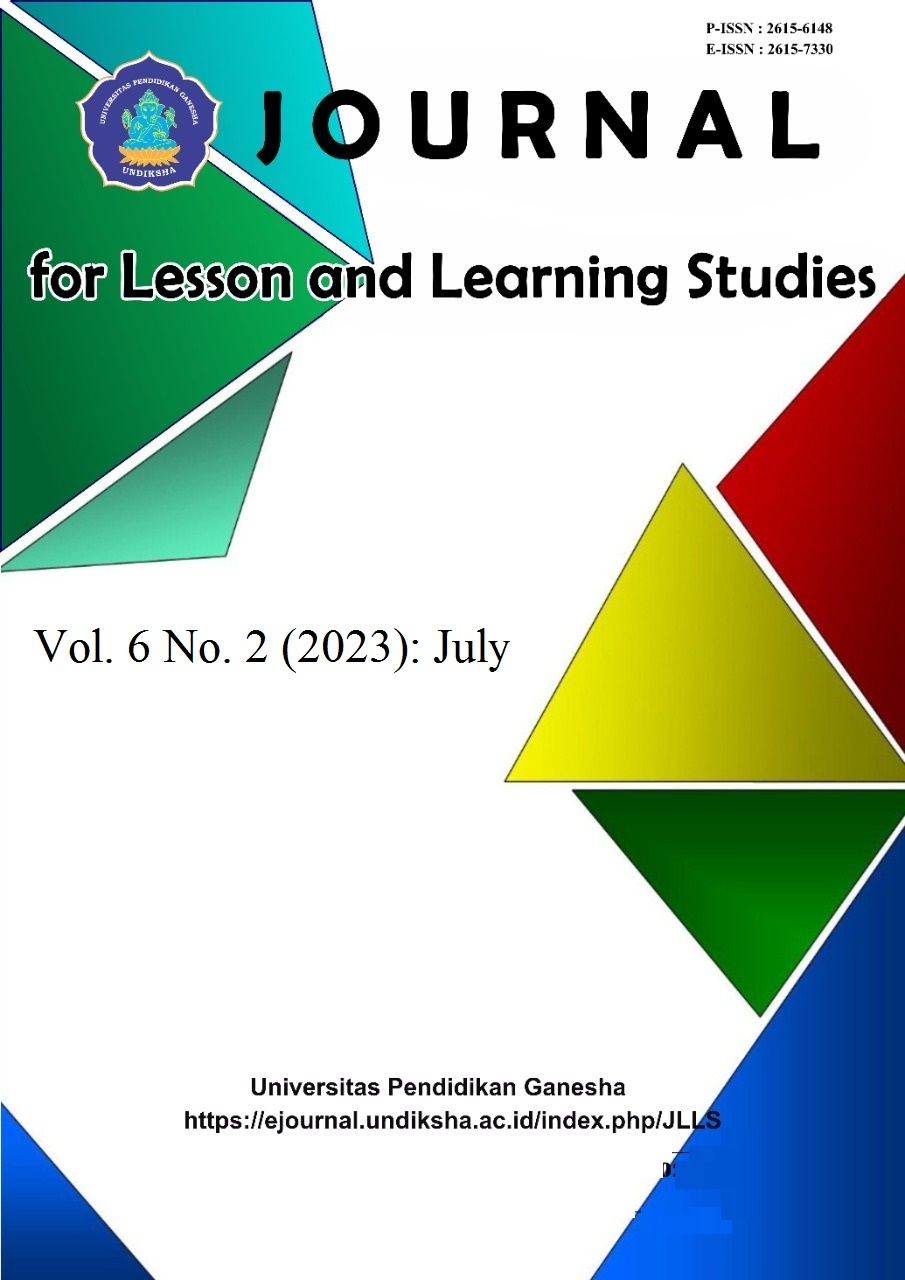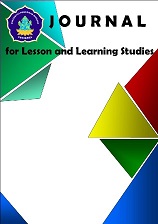Absorption Rate of Industrial Program Vocational High School Students to the World of Work
DOI:
https://doi.org/10.23887/jlls.v6i2.60000Kata Kunci:
Vocational High School, Industrial Class, World of WorkAbstrak
The development of industrial technology today is very fast. However, vocational high schools as a workforce generator do not have good readiness to meet the needs of the industrial world of work. This study aims to analyze the planning, implementation, evaluation, and absorption of students in the industrial class. This study used a qualitative approach with interview, observation, and documentation techniques. Data analysis includes two things, namely the implementation of analysis before in the field and analysis during the field. The results showed that industrial class planning had been carried out well, with curriculum synchronization, street vendors students, apprentice teachers, and guest teachers. Evaluation of activities is carried out periodically once a year. Student absorption in the 1st vocational school industry reaches 94% at PT Alfamart, while the 2nd vocational school is only absorbed 50%, with 30% at PT Daihatsu and 20% in other industries. Thus, the industrial class program at vocational school has been successfully implemented properly. The implication of the results of this research is that stakeholders, such as schools, government and industry, can work together to improve vocational education and increase job opportunities for vocational school graduates.
Referensi
Achsani, H., Kustono, D., & Suhartadi, S. (2020). Industrial Class Model in the Mitsubishi School Program at Vocational High Schools. Journal of Education: Theory, Research and Development, 5(8), 1078.https://doi.org/10.17977/jptpp.v5i8.13878.
Aguss, RM, Amelia, D., Abidin, Z., & Permata, P. (2021). Training on Making Teaching Syllabus and RPP Tools for SMK PGRI 1 Limau. Journal of Social Sciences and Technology for Community Service (JSSTCS), 2(2), 48.https://doi.org/10.33365/jsstcs.v2i2.1315.
Anitasari, ME, Jatmoko, D., Primartadi, A., Isbakhi, AF, & Laksana, HS (2022). Level of Work Readiness of Industrial Class and Non-Industrial Class Students in Vocational High Schools. Educational Window Journal, 2(04), 613–620.https://doi.org/10.57008/jjp.v2i04.344.
Aprilia, DD, Riswandi, R., & Sugiyanto, S. (2023). Development of Training Design to Improve the Competency of Productive Teachers in the Field of Engineering Technology. Academia, 12(01), 121–137.https://doi.org/10.34005/akademika.v12i01.2690.
Arifin, Z. (2017). Implementation of Partnership-Based Strategic Management in Improving the Quality of Vocational Schools (Study at Automotive Technology Group Vocational Schools in Yogyakarta City). Journal of Educational Administration, 9(1), 60–70.https://doi.org/10.17509/jap.v14i1.6708.
Efendi, S., Dardiri, A., & Irianti, AHS (2019). Contribution of Teacher Qualifications and Infrastructure to Learning Activities and On the Job Training and Their Impact on the Soft Skills of Industrial Class Students. Journal of Education: Theory, Research and Development, 4(10), 1293.https://doi.org/10.17977/jptpp.v4i10.12806.
Haryani, S., Prasetya, AT, Dewi, SH, & Fadillah, A. (2022). Preparation of Vocational School Teaching Materials Integrated into Vocational Context in Chemistry Learning. Journal of Chemical Education Innovation, 16(2), 131–137.https://doi.org/10.15294/jipk.v16i2.31633.
Husein, MT (2019). Link and Match Vocational School Education. Rausyan Fikr: Journal of Thought and Enlightenment, 15(2), 39–47.https://doi.org/10.31000/rf.v15i2.2037.
Khadifa, A., Indriayu, M., & Sudarno. (2018). The Influence of Industrial Work Practices and Self-Efficacy on the Work Readiness of Class XI Students at SMK Negeri 1 Banyudono 2017/2018. Journal of Business and Economic Education, 4(1), 1–13.https://jurnal.fkip.uns.ac.id/index.php/ptn/article/view/11968.
Maulina, M., & Yoenanto, NH (2022). Optimizing Links and Matches as an Effort to Relevate Vocational Schools to the Business and Industrial World (DUDI). Journal of Educational Management Accountability, 10(10), 27–37.https://doi.org/10.21831/jamp.v10i1.48008.
Miladiah, SS, Syaodih, C., & Permadi, D. (2021). Teaching Factory Learning Management in Improving the Competency of Graduates of State Vocational School 3 and State Vocational School 15 in Bandung City. Journal of Classroom Action Research and Learning Research, 4(3), 441–454.https://doi.org/10.31604/ptk.v4i3.441-454.
Nugroho, W. (2022). Integration of Character Education in Vocational Education in Vocational High Schools. Vocational: Journal of Vocational Education Innovation, 2(1), 73–84.https://doi.org/10.51878/vocational.v2i1.936.
Priambudi, P., Mahmudah, FN, & Susatya, E. (2020). Industrial Class Management in Vocational High Schools. PTK (Vocational Technology Education) Journal, 3(2), 15–25.https://garuda.kemdikbud.go.id/documents/detail/1748462.
Rabiah, S. (2019). Higher Education Management in Improving the Quality of Education. Management Rays, 6(1), 58–67.https://jurnal.unismuhpalu.ac.id/index.php/JSM/article/view/551.
Riswati, Y., Indriayu, M., & Totalia, SA (2021). The Influence of Industrial Classes and Internal Locus of Control on the Work Readiness of Online Business and Marketing Vocational School Students in Surakarta. Journal of Education and Business Economics, 7(1).https://doi.org/10.20961/bise.v7i1.72990.
Roseno, I., & Wibowo, UB (2019). External efficiency of vocational education in Yogyakarta City. Journal of Educational Management Accountability, 7(1), 15–24.https://doi.org/10.21831/amp.v7i1.10558.
Rosmawati, R., & Meilani, RI (2019). Contribution of productive subjects in building work readiness of vocational school students in Indonesia. Journal of Office Management Education, 4(1), 94.https://doi.org/10.17509/jpm.v4i1.14960.
Rusmana, D. (2020). The Influence of 21st Century Digital Skills on Entrepreneurship Education to Improve Entrepreneurship Competence of Vocational School Students. Journal of Educational Economics and Entrepreneurship, 8(1), 17.https://doi.org/10.26740/jepk.v8n1.p17-32.
Santi, T.D., & Faridah, A. (2021). Validity of Moodle-Based Mobile Learning Development at Aisyiyah Tourism Vocational High School on Food Ingredient Knowledge Subjects. Cakrawala: Journal of Education, 15(1).https://doi.org/10.24905/cakrawala.v15i1.263.
Sari, AK, Giatman, M., & Ernawati, E. (2022). Teaching factory learning management in improving the skills competency of students majoring in beauty care at vocational high schools. JRTI (Indonesian Journal of Action Research), 7(2), 148.https://doi.org/10.29210/30031696000.
Smaragdina, AA, Nidhom, AM, Soraya, DU, & Fauzi, R. (2020). Training on the Utilization and Development of Interactive Multimedia-Based Digital Teaching Materials to Face the Era of Industrial Revolution 4.0. KARINOV Journal, 3(1), 53.https://doi.org/10.17977/um045v3i1p53-57.
Sudaryono, Elmanda, V., Purba, AE, Ayu Sanjaya, YP, & Julianingsih, D. (2022). Effectiveness of the Vocational School Student Internship Program in Serang City Using the CIPP Method in the New Normal Adaptation Era of the Covid-19 Pandemic. ADI Interdisciplinary Digital Business Journal, 3(1), 5–15.https://doi.org/10.34306/abdi.v3i1.565.
Suwardi. (2021). Stem (Science, Technology, Engineering, and Mathematics) Innovation in Vocational Learning in the Era of Independent Learning in the 21st Century. Pedagogy: Journal of Educational Science and Psychology, 1(1), 40–48.https://doi.org/10.51878/paedagogy.v1i1.337.
Walsiyam. (2022). Industrial Class Learning Management in Refrigeration and Air Conditioning Engineering Skills Competencies in Vocational Schools. Journal of Educational Management Media, 5(1).https://doi.org/10.30738/mmp.v5i1.11531.
Widiyanti, W., Solichin, S., & Yoto, Y. (2017). Vocational and Industrial High School Collaboration (Case Study of Malang National Vocational School Industrial Class Education with Astra Honda Motor). Technology And Vocational: Journal of Technology, Vocational, And Their Teaching, 40(2), 181–192.https://doi.org/10.17977/um031v40i22017p181.
Wijanarka, BS, Wijarwanto, F., & Mbakwa, PN (2023). Successful implementation of teaching factory in machining expertise in vocational high schools. Journal of Vocational Education, 13(1), 1–13.https://doi.org/10.21831/jpv.v13i1.51811.
Zuhairoh, N., & Pattinasarany, IRI (2021). Vocational High School (SMK) Partnership with the Business/Industrial World (DU/DI) as an Implementation of Vocational School Revitalization (Study of Partnership Governance at Private Vocational Schools "DP" in East Jakarta). JISIP (Journal of Social Sciences and Education), 5(3).https://doi.org/10.58258/jisip.v5i3.2391.
Unduhan
Diterbitkan
Cara Mengutip
Terbitan
Bagian
Lisensi
Hak Cipta (c) 2023 Mulyanto, Eko Nugroho Widodo

Artikel ini berlisensiCreative Commons Attribution-ShareAlike 4.0 International License.
Authors who publish with the Journal for Lesson and Learning Studies agree to the following terms:
- Authors retain copyright and grant the journal the right of first publication with the work simultaneously licensed under a Creative Commons Attribution License (CC BY-SA 4.0) that allows others to share the work with an acknowledgment of the work's authorship and initial publication in this journal.
- Authors are able to enter into separate, additional contractual arrangements for the non-exclusive distribution of the journal's published version of the work (e.g., post it to an institutional repository or publish it in a book), with an acknowledgment of its initial publication in this journal.
- Authors are permitted and encouraged to post their work online (e.g., in institutional repositories or on their website) prior to and during the submission process, as it can lead to productive exchanges, as well as earlier and greater citation of published work. (See The Effect of Open Access)





